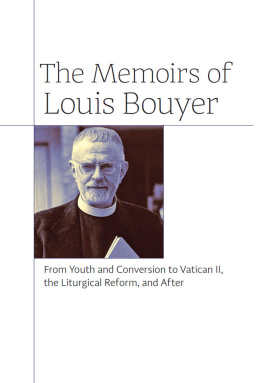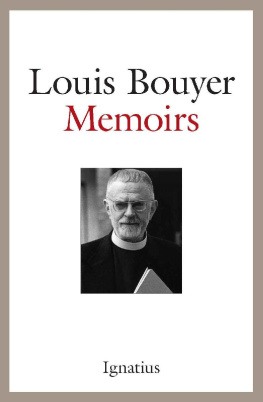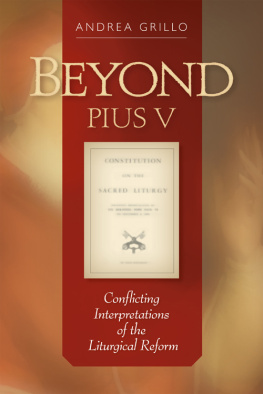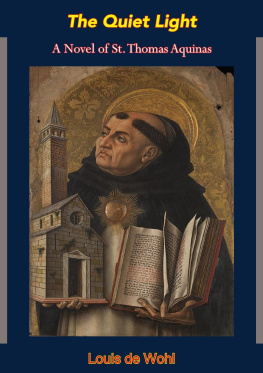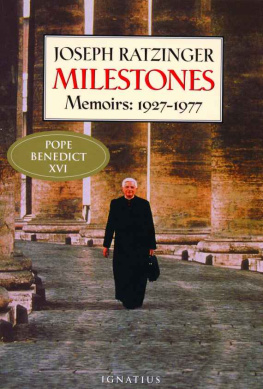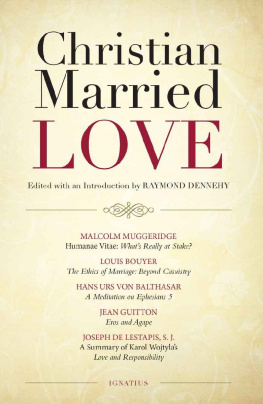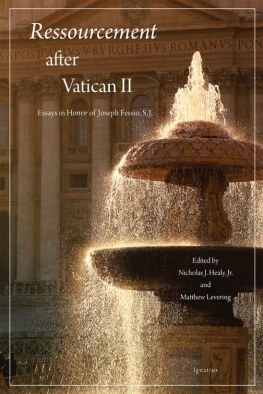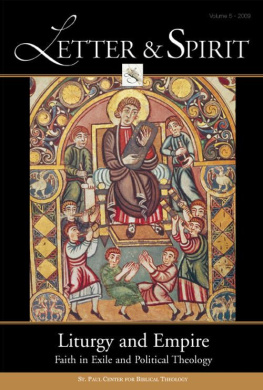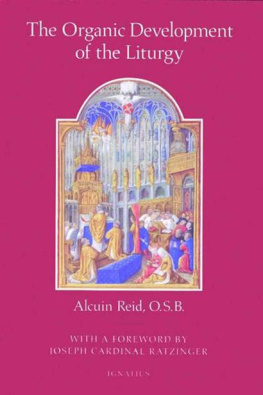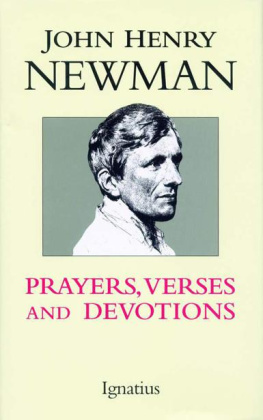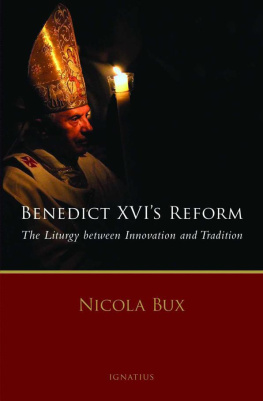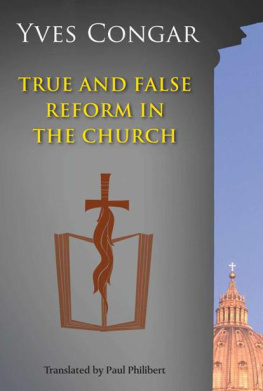The Memoirs of Louis Bouyer
From Youth and Conversion to Vatican II,
the Liturgical Reform, and After


First published in French as
Louis Bouyer, Mmoires
Les ditions du Cerf, 2014
24, rue des Tanneries, 75013 Paris, France
First published in English by Angelico Press, 2015
English translation and Preface John Pepino, 2015
Foreword Peter Kwasniewski, 2015
All rights reserved
No part of this book may be reproduced or transmitted,
in any form or by any means, without permission.
For information, address:
Angelico Press
4709 Briar Knoll Dr.
Kettering, OH 45429
www.angelicopress.com
Pbk: 978-1-62138-142-6
Cloth: 978-1-62138-143-3
Cover design: Michael Schrauzer
CONTENTS
Foreword
Peter Kwasniewski
CONSIDERING THAT he was a highly influential theologian, a scholar of great stature, and a friend of other famous theologians in the Church of the twentieth century, it is strange how little attention has been paid in recent years to Fr. Louis Bouyer (19132004). Part of the problem is surely that Fr. Bouyer, although he came across as rather avant-garde in preconciliar years, ended up looking extremely conservative as he protested with increasing stridency against the depressing postconciliar auto-demolition of the Church. His honesty in assessing both the damage and the motivationsan honesty at times acerbic and always innocent of the hunger for human respectwas surely not destined to win him a favored place at the table of public opinion or a memorial from friends grateful for his criticism.
Nevertheless, at the zenith of his academic career, Fr. Bouyer was revered far and wide for a series of refined, far-reaching, ground-breaking studies, many of which had already attained the status of classics before his deathand all of which deserve to be rediscovered by a new generation. In such works as The Meaning of the Monastic Life (1950), Liturgical Piety (1955), The Liturgical Life: A Constructive Critique of the Liturgical Movement (1956), Woman and Man with God: An Essay on the Place of the Virgin Mary in Christian Theology and Its Significance for Humanity (1957), Newman: His Life and Spirituality (1958), Christian Initiation (1958), The Meaning of Priestly Life (1960), Introduction to Spirituality (1960), Rite and Man: Natural Sacredness and Christian Liturgy (1962), The Liturgy Revived (1964), Eucharist: Theology and Spirituality of the Eucharistic Prayer (1966), Liturgy and Architecture (1967), The Church of God, Body of Christ and Temple of the Spirit (1970), The Eternal Son: A Theology of the Word of God and Christology (1974), The Invisible Father: Approaches to the Mystery of the Divinity (1976), and Cosmos: The World and the Glory of God (1982), Bouyer established himself as an expert in a number of fields, with a particular gift for discerning and describing the subtle interplay of Sacred Scripture, ecclesiastical dogma, liturgical history, and ascetical-mystical theology. His is a kind of auda Not unexpectedly, we find the likes of Henri de Lubac, Yves Congar, Hans Urs von Balthasar, and Joseph Ratzinger avidly reading and discussing Bouyers work throughout the middle period of the century.
While he would later distance himself from certain stances of his earlier writings (in light of the excesses of the liturgical reform, for instance, he came to regret some of his quondam critiques of the classical Roman liturgy), it could never be said that he had been irresponsible in his inquiries or impure in his purposes. There was always in Bouyer a fierce desire to get at the truth, to work at a problem from every angle and with every resource available, to take all the voices of a dense and diverse Christian tradition seriously, and to make of his mind, as well as of the age in which he lived, a worthy gift to his Lord. In this, we see part of the reason Cardinal Newman appealed so deeply and, one might say, connaturally to Bouyer. Both men had the same broad, searching, even restless intellect lifting its lamp to guide a heart of inextinguishable piety; blessedly free of self-absorbed sentimentality, both could sparkle with mordant humor. They appreciated the humble, simple things of life as much as they did the sophisticated literary ones, time with dear old friends in dear old places as much as (or more than) famous engagements in lofty arenas. Like Newman, Bouyer exemplifies an intellect baptized into Christ, permeated with evangelical charity. We see these admirable qualities of Bouyers character, not to mention a more mischievous side, shimmering in the pages of his memoirs, as he gracefully courses over the years of his life, the many famous and not-so-famous people who walked with him or away from him, the private and public events that tested his mettle and called forth the powers of his personality.
With these virtues and accomplishments, it is no wonder Bouyer held a front-seat position in the run-up to the Second Vatican Council, participated in its preparatory committees, became a close friend of Pope Paul VI (of whom he speaks with a curious combination of affection and bewilderment), and worked in the midst of the Consilium that revised the Roman liturgy. As these pages vividly show, Bouyer grew increasingly disaffected not only with the implementation of the liturgical reform but, more strikingly, with the very assumptions and processes of the reform itself. Although he was a man who skewered many types of opponents, including those he perceived (fairly or not) as theologically illiterate, change-fearing traditionalists, he came down very much on the side of Catholic tradition and very much against the mentality and project of Annibale Bugnini, whose manipulativeness and mendacity he witnessed firsthand and reports with unsparing candor in these memoirs. As Bouyer writes:
It was... already quite clear that the majority of the priests who took an interest in the new [i.e., liturgical] movement came not at all to give back to the traditional liturgy all of its hidden meaning and all of its life-giving reality. They intended gradually to substitute for it another liturgy or, as the expression went, a paraliturgy. This was to be more in conformity with the tastes and mental habits of what these nice folks called modern man. (160)
It seems as if only now, a half-century after the Second Vatican Council, are historians and theologians possessed of the critical distance and the pre-modern/post-modern conceptual tools to develop a nuanced understanding of that epoch-making event and its ambiguous, ambivalent legacynot merely in regard to the much-lamented dismantling of the Roman Rite, but also, and perhaps even more importantly in the long run, the semi-heretical revamping of ecumenism, the invention of an interreligious dialogue based on nominal parallels, and the embarrassingly nave embrace of tricolored political philosophy. Thanks to the work of such authors as Romano Amerio and Roberto di Mattei and, on a popular plane, the growing traditionalist movement, an increasing number of Catholics have at last begun to move decisively beyond the days of conciliar triumphalism, the fashionable flirtation with modernity, and the promethean, neo-Pelagian exaltation of scientific progress, social reconstruction, and spiritual autonomy, all of which were manifested in a whirlwind of institutional innovation that spelled (to borrow the title of Bouyers 1968
Next page
